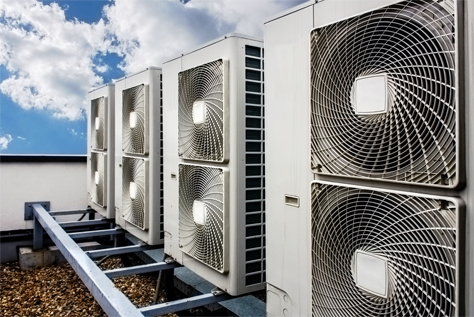
Solutions
HVAC System Types
Variable Refrigerant Volume Systems (VRV - Heat Pump & Heat Recovery) - Chilled Water Systems - Direct Expansion Systems – Evaporative cooling.

 Ozone Friendly:
Ozone Friendly:
Inverter Split systems operate with R-410A refrigerant, fast becoming the industry standard of the future due to its energy-efficient and zero-ozone-depleting properties. Daikin not only produces R-410A but also optimizes every major system component to work with it, resulting in higher performance, higher EER ratings and lower energy costs.
 Variable Refrigerant Volume Systems (VRV)
Variable Refrigerant Volume Systems (VRV)
This technology circulates only the minimum amount of refrigerant needed at any one time and enables individual climate control of air conditioning zones. The name VRV *derives from this technology that we call “variable refrigerant volume“. There are two types of systems heat pump & heat recovery. Used in commercial applications and specialised residential systems.
 Chilled Water
Chilled Water
Chilled water cooling is very different from typical residential air conditioning where water is pumped from the chiller to the air handler unit to cool the air, which captures the heat from the air, then disperses the air throughout the area to be cooled.
 Direct Expansion Systems (Split units)
Direct Expansion Systems (Split units)
DX units are known as your split units, you have individual indoor evaporative and linked to the matching outdoor condensing unit.
 Evaporative Cooling
Evaporative Cooling
When air comes into contact with water, the water evaporates and absorbs heat thereby cooling the air. The drier the air, the faster the rate of evaporation and the greater the cooling effect.
 Rooftop Package units:
Rooftop Package units:
A central unit consisting of a blower, heating and cooling elements, filter racks or chamber, dampers, humidifier, and other central equipment in direct contact with the airflow.
 Energy Saving Solutions
Energy Saving Solutions
Inverter technology. What is it?Conventional air conditioners operate at a fixed speed, delivering a fixed amount of cooling and heating. While trying to maintain a set temperature they operate on the 'stop and start' principle.
An Inverter system is a much more advanced technology that operates differently.
It works like the accelerator of a car, gently increasing or decreasing power.
It reaches the desired temperature quicker and maintains it without wild fluctuations.
Advantages:
Less Frequent Stop/Start Cycles
Conventional air conditioners run compressors at a fixed rate meaning they must stop and start all the time. As a result, they make lots of noise and use up plenty of energy. Inverter systems run continuously at varying speeds, delivering hot or cool air only as needed. This innovative technology allows air-conditioning systems to achieve up to 26.1 (HSPF) and generate further energy savings during partial load conditions. What’s more, with continuous operation, the room experiences better dehumidification and the compressor incurs less stress.
(Heating Seasonal Performance Factor) – the higher the factor the better the efficiency.
 Brands we use
Brands we use



















